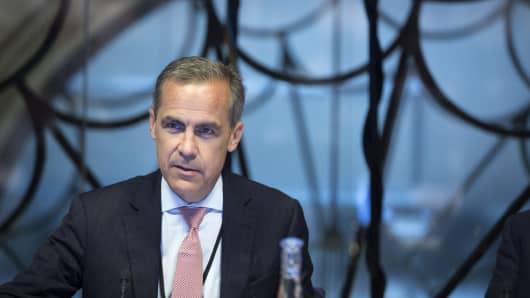Bank of England (BoE) governor Mark Carney's new unemployment mandate will face its first test on Wednesday, when the U.K. will release unemployment numbers for July.
Carney announced last week that the central bank will target low unemployment as well as low inflation from now on, with interest rates to remain at record lows until unemployment falls to 7 percent or lower. This new dual mandate means the next jobs number – due on Wednesday at 9.30 a.m. London time – will take on an "unprecedented" level of significance, according to Philip Rush, an economist at Nomura.
(Read more: 'Life is harder' for UK workers as wages slide)
Robert Wood, chief U.K. economist at Berenberg Bank, told CNBC that every minor change in monthly unemployment numbers will now cause a ripple of speculation about whether the BoE will hit its threshold early or late.
"It is certainly now much more important than it used to be," Wood told CNBC. "If it bounces down to 7.7 percent on Wednesday, or up to 7.9 percent, I don't think it's realistically a big deal, although it may not be interpreted that way."
Unemployment in the U.K. currently stands at 7.8 percent, and a Reuters poll of economists suggests that number will be unchanged come Wednesday. The lowest estimate from the analysts was for a fall to 7.7 percent and the highest was for an uptick to 8 percent.
(Read more: UK economy in good shape, more positive news unveiled)
The BoE forecasts the 7 percent threshold will not be hit before the third quarter of 2016, with the unemployment rate projected to stand at 7.1 percent, three years from now.
Brian Hilliard, chief U.K. economist at Societe Generale, said the central bank had held itself "hostage to fortune" by placing unemployment at the heart of its policy.
(Read more: UK 'Brixit' – have the chances increased?)
"The U.K. economy is gathering steam and we could easily see the [unemployment] rate fall steadily in the coming quarters. The Bank's prediction of a 7.1 percent plateau rests on the implicit assumption of a sudden improvement in productivity in the next few years but nobody, including the Bank, currently has a convincing explanation of the sudden fall in productivity during the recession," Hilliard said in a note on Monday.
Carney Undermined?
Another potential pitfall for Carney on Wednesday is the release of the minutes from last week's monetary policy meeting, which will show whether Carney garnered unanimous approval for both the interest rate decision and his move towards forward guidance.
If any monetary policy committee (MPC) members dissented from offering forward guidance, that would be extremely significant, according to Wood.
"Guidance only works in guiding markets if there is sufficient belief that the central bank actually means what it says," Wood said. "If a member can dissent from the policy framework, what's to say that another one couldn't change their mind in the future, and decide that [forward] guidance wasn't the right policy?"
Although markets predict that the decision to offer guidance was unanimous, Hilliard said there was a small risk that a hawkish committee member dissented. He warned that a split vote could have enormous market impact, as it would throw doubt on whether interest rates were really likely to remain unchanged until late 2016.
(Read more: Why investors should brace for a Gilt sell-off)
Economists at Investec noted that several members of the MPC, including Deputy Governor Charlie Bean, have previously expressed doubts about the use of forward guidance as a policy tool.
"We do not expect the debate about whether to issue forward guidance to have been a simple one, " Investec said in a research note on Monday. "However, we suspect the new governor will in the end have gained the unanimous backing of his committee in this announcement, but at a cost, as he sought to reassure his committee that the MPC's credibility was not at risk."
—By CNBC.com's Matt Clinch. Follow him on Twitter @mattclinch81



